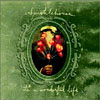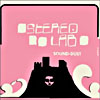
This Week: Sparklehorse returns from the depths, Bjork shows us the Northern Lights and Stereolab gets jazzy
Sparklehorse
It's a Wonderful Life (Capitol Records)

In 1996, during the tour for Sparklehorse's first album, Vivadixiesubmarinetransmissionplot, Mark Linkous passed out in his London hotel room after a dose of painkillers and antidepressants. He spent 14 hours on the floor with his legs pinned underneath him, and needed months of physical therapy and several surgeries before he could walk. The trauma reportedly inspired the next Sparklehorse record, 1999's Good Morning, Spider, a dark, sprawling collage of feedback mixed with introspective and cryptic ballads.
Good Morning, Spider was apparently a cathartic exercise for Linkous. The new album, It's a Wonderful Life, reflects his newfound sobriety; it's the most focused and accessible Sparklehorse record to date, and the noisy experimentation and curiosity that made Good Morning, Spider one of 1999's best surprises is almost entirely absent.
That's not to say that Linkous' vision of the world is anything like normal. He's still a madly skewed songwriter. Images of ponies in hell and kissing skeletons pop up throughout It's a Wonderful Life, as do a handful of lacerating Crazy Horse-style guitar rave-ups. It's just that the dark lyrics and guitar skwonk are more restrained here, and only highlight the general mood of leisurely uneasiness, rather than propel the songs into nightmarish swirls of sound.
The highlight comes early. The third track, "Piano Fire," is a masterly nugget of guitar pop, bolstered by a powerhouse back-up performance by P.J. Harvey. "King of Nails," with its fuzzed-out chorus and garage-rock guitar solos, recaptures the bleak rage of Good Morning, Spider, but the second half of It's a Wonderful Life drowns in strings and piano and falters under its deliberate pace.
Surely no one is callous enough to wish that Linkous had faced another life-altering brush with disaster on the way to completing It's a Wonderful Life. By most standards, he's released a disturbing, inventive and polished record. But the album lacks the emotional and sonic firepower of its predecessor, and that's worth some regret.
—Matthew T. Everett
Bjork
Vespertine (Elektra)

If Iceland didn't already exist, you'd pretty much have to invent it just to make sense of Bjork. Over the past decade, the eccentric diminutive singer has created an essentially new music, one that feels intractably connected to the Scandinavian island of her birth. Using an unlikely combination of ingredients—skittering techno percussion, sweeping movie-score strings, choral harmonies, computer bleeps and pings—she produces complex, melodic pop music that inevitably brings forth Nordic metaphors. It's hard to write about her without invoking Northern lights, glaciers and whale songs.
But that makes her sound a good deal more precious than she is. As gentle as her music can be—and Vespertine, her fifth solo album, is her gentlest yet—there's a gutsy playfulness to it, a willingness to make sudden dives into dark depths, that never lets you get too comfortable. There is also the not-small matter of her voice. I've always liked it, with its cracked pixie cadences, weird child-like whoops and beat-defying jazzy enunciation. As with her music, there is no direct antecedent. There's bits of Kate Bush in there, bits of Billie Holiday too, and an awful lot of classic Broadway (if classic Broadway were sung by drunken elves). But for the uninitiated, it can take some adjusting.
What most distinguishes Vespertine from previous albums is a surer sense of song structure and a richer lyrical approach. Although she's still not writing anything like normal pop songs, Bjork is refining her melodies to the point where they almost sink in without you noticing. You can almost (almost) sing along to most of these songs. And the lyrics, written in jagged non-native English, are increasingly poetic in their detail and penetration: "A mountain shadow/ suggests your shape/ I fill my mouth with snow/ The way it melts/ I wish to melt before you." But then, for all its internalized dialogue, my favorite single moment on the album is when the music stops and Bjork simply sings "I love him, I love him, I love him" over and over and over.
In short, a strange and lovely recording.
—Jesse Fox Mayshark
Stereolab
Sound-Dust (Electra)

As identifiable as Stereolab's sound is, the group has managed to manipulate it in quite a few different ways throughout its nearly 10-year career. They've given us noisy feedback (a kind of European Sonic Youth), drone and space-age lounge music.
Their latest release, Sound-Dust, may be their warmest recording yet. The group has always heavily layered its sound, contrasting it with Laetitia Sadler's monochromatic but soothing voice, which seems to peep out a melody distinct from the music. On Sound-Dust, Stereolab is downright soulful, with jazzy horn playing and lush arrangements—finding almost the perfect balance to Sadler's vocals.
I've rarely been able to figure out what Sadler is saying, even when she's singing in English, not French, as she does half the time. Her words—like the bands music—tend to wash over me. But that's part of the charm and eventually I start humming along.
Not quite a radical departure, Sound-Dust finds Stereolab at its most relaxed and assured.
—Joe Tarr

September 27, 2001 * Vol. 11, No. 39
© 2001 Metro Pulse
|